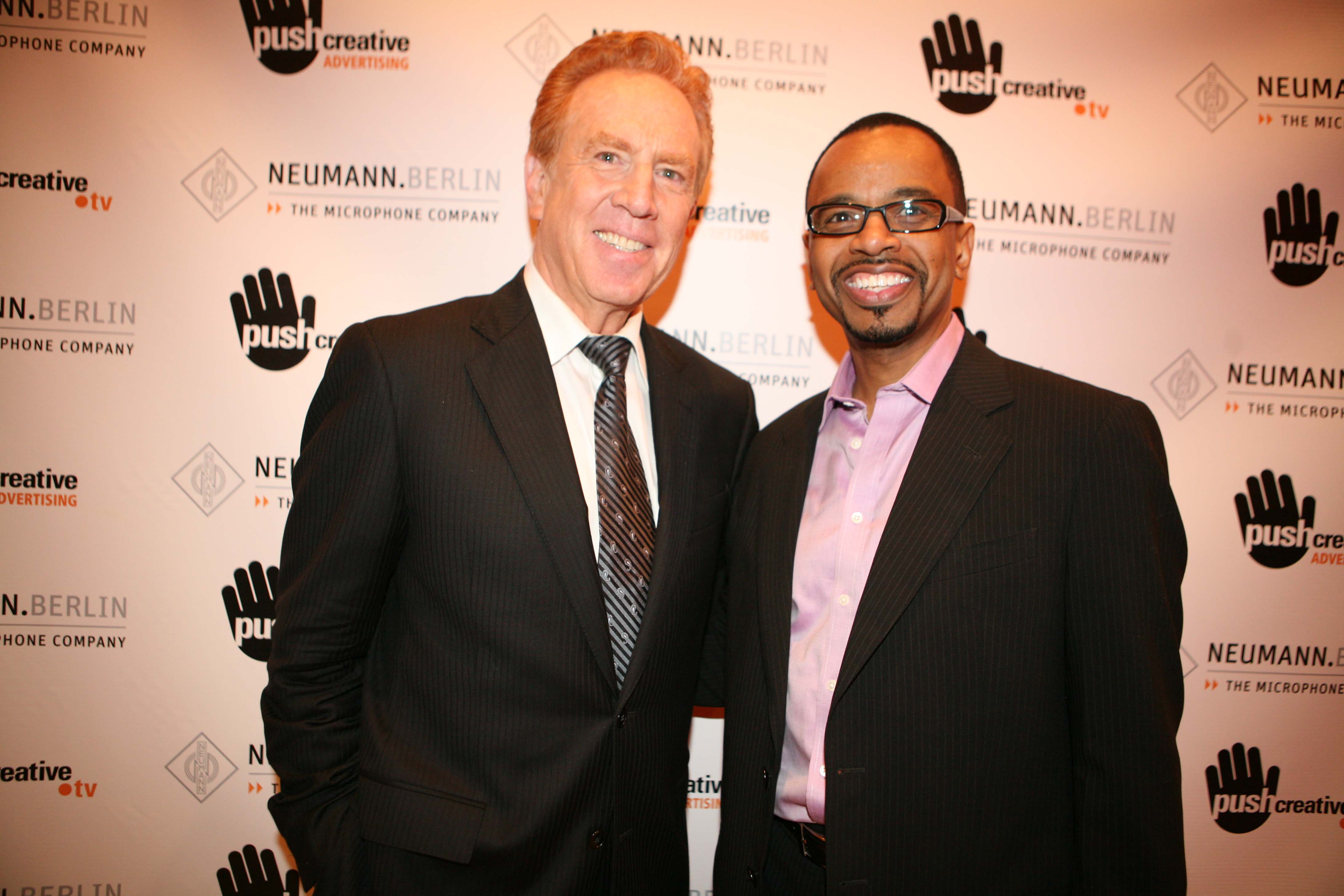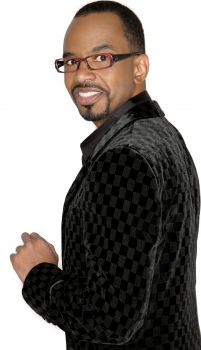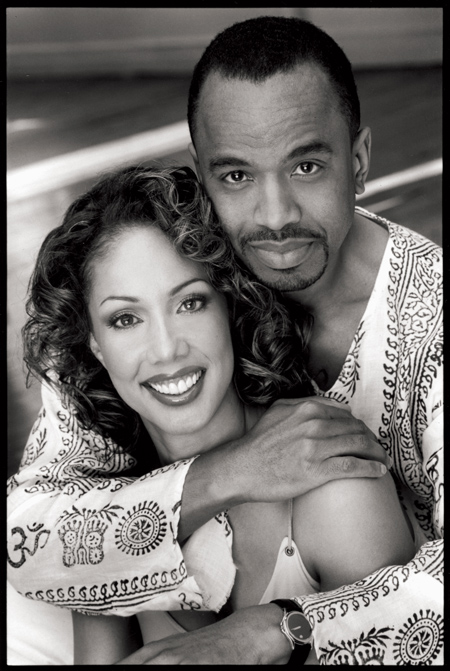 Rudy Gaskins, right, shares a laugh with Alan Kalter, the popular on-camera announcer of the The Late Show with David Letterman.
Ask Rudy #4:
Marketing & Branding Yourself:
Why Should They Choose YOU?
Top creative director/producer Rudy Gaskins is "on the other side of the glass" from voice talent - helping voice seekers find the right voice for their projects. So - what gets a talent's foot in the door ... and a lingering welcome mat? It's a "delicate dance" of marketing, branding and networking, as Rudy explains in Part 4 of this exclusive VoiceOverXtra series.
By Rudy Gaskins
CEO & Executive Creative Director
Push Creative
 Q: Do producers mostly prefer male voices over female? Q: Do producers mostly prefer male voices over female? Individual producers may or may not have a say in whether the voice is male or female, so it doesn’t always matter what they think.
But let’s lump them into the category of “client” and answer the question this way:
While the industry uses mostly male voices, the voice - male or female - is often chosen based on what the client believes the product calls for.
Unfortunately, a noticeable bias for male voices does exist. I believe this bias will change as more creative professionals evolve in their awareness of women as equal partners.
But this is not a political change as much as it is a transformative change in how we perceive gender, power, persuasion, etc.
On a positive note, the voice actor needn’t be concerned about the male vs. female question. Just audition for as many opportunities that come your way, and keep developing your skills in the interim.
Q: How much does the age of the voice-over actor matter?
“Actual age” in voice-over usually covers quite a wide range in “perceivable age.”
This is a good thing for voice-over actors for obvious reasons.
On the other hand, aging shapes the quality of one’s voice over time. It can’t be avoided. When your age becomes discernable to the ear, you will be constrained to rolls where your voice is appropriate.
Now, a critical point to make in this regard is that the voice-over actor can often take advantage of anonymity.
If, for example, you’re very young with a very mature sound, the last thing you want to do is spoil your chances by sending a picture and resume that might have the client unconsciously stereotype you as “too young” or vice versa.
This is a mistake many voice-over actors make because they just can’t resist putting a great head shot on the demo packaging.
Q: How often do you use people with accents other than American?
For the past year, I’d put it at 10%. Before that, it was 5%.
Q: Does it help my chances of getting hired if I send the producer a well-packaged demo with picture and resume?
What you think is “well packaged” may be very different from a seasoned marketer who is trained in packaging products.
Consider that even the hiring of the voice actor is part of an overall marketing package.
My point is that you’re handing your package to a packaging expert. Invest some money in a professional artist or branding expert who can ensure that you deliver a solid package.
Let the artists do what they do, unencumbered by your ego and untrained eye about what makes good branding.
IT'S AN ART
A good artist will decipher what you need and address the overall marketing issues based on interviewing you.
When developing packaging, keep in mind that clients are hiring you for your voice, not your face. If they see your face, it is likely that unconscious stereotyping can occur in a way that goes against you. And once that happens, the client may not be able to hear your voice because of the "noise" created in his subconscious based on seeing your picture.
Conclusion: While your look has nothing to do with your voice, it can have everything to do with how your voice is perceived.
Don’t risk confusion.
Q: How do I brand myself as a voice-over actor?
First you have to understand what you have to sell in terms of your voice-over capabilities:
and as a professional collaborator:
Work this out with your agent, and keep your agent apprised of new developments in additional training or techniques you pick up over time.
Now that you know what you have to sell, branding is a process of getting that understanding into the minds of all with whom you come into contact.
A branding professional can be worth the time and money here. Everyone thinks they can do branding, but it’s not a DIY proposition.
WHAT YOU'RE SELLING ...
If you must go it alone, the first and foremost thing you’re selling is “interpretive skill and sound quality.”
Find whatever adjectives best illuminate and reinforce the value and truth about your skill.
Branding should point out the advantageous aspects of your talent, and be a match with the real thing when the client is dealing with you in the studio.
Aside from talent, the attributes that keep me coming back to the same actors are:
Q: Does it pay to network with producer/directors, or is it really up to the agents to get me the job?
It’s mostly up to agents, managers, and industry word-of-mouth. But there’s a great deal you can do to give those people good stuff to work with.
I like to point out that as hard as the agent works, they get only 10% of the money, and that leaves the talent with doing the work to earn the other 90%.
That work doesn’t end with showing up for auditions and jobs!
It means finding creative ways, traditional and non-traditional, to put yourself out there in the best possible light.
This is a delicate dance, especially when it comes to networking with buyers (producers, creative directors, etc.), because these people do not generally spend time listening to and categorizing voices for later use.
They depend on agents for the expertise of supplying the best voices.
SHUN HARD SELL
That doesn’t mean you can’t leave a lasting positive impression on a producer. The best impression will probably come from just being a fun conversationalist and not pursuing any ulterior motive.
Most people recoil from the hard sell. Unfortunately, most actors have a hard time understanding this approach, and can’t wait to pitch themselves for hire.
Desperation may get you a handout, but it won’t get you a job.
Q: What do you listen for in a demo?
First, the demo has to be in the genre in which I’m hiring - promo, commercial narration, etc.
From there, I’m listening for a figment of my imagination – the voice that I and the marketing team conjured up as the magical personality that would best embody and give life to the product.
Assuming I find the voice quality, I’m also looking for a high level of interpretive prowess, versatility and the power to bring words and ideas to life.
Also See:
ABOUT RUDY ...
 Emmy-winning producer Rudy Gaskins is CEO and Executive Creative Director of Push Creative Inc., a branding services company providing strategic marketing, graphic design and video/film production for TV broadcast networks and corporations. Clients include Lexus, FOX News Channel, BET, American Express, Spike TV, ABC Television, History Channel, MSNBC, and NBC Sports. Drawing on his former experience as a filmmaker and writer/producer/director for PBS, Gaskins has recently expanded Push Creative’s production scope to include program development, and is actively developing projects in several genres. He also coaches professional and aspiring voice-over actors in the development of performance technique. He is co-writer of Secrets of Voice-Over Success by Joan Baker (pictured with Rudy), with whom he is also a partner in marriage and in offering voice-over training. Emmy-winning producer Rudy Gaskins is CEO and Executive Creative Director of Push Creative Inc., a branding services company providing strategic marketing, graphic design and video/film production for TV broadcast networks and corporations. Clients include Lexus, FOX News Channel, BET, American Express, Spike TV, ABC Television, History Channel, MSNBC, and NBC Sports. Drawing on his former experience as a filmmaker and writer/producer/director for PBS, Gaskins has recently expanded Push Creative’s production scope to include program development, and is actively developing projects in several genres. He also coaches professional and aspiring voice-over actors in the development of performance technique. He is co-writer of Secrets of Voice-Over Success by Joan Baker (pictured with Rudy), with whom he is also a partner in marriage and in offering voice-over training.Email: rudy@pushcreative.tv
Web: www.pushcreative.tv
Voice-Over Training: http://joanbaker.tv/voice-over_coaching.php
Facebook: www.facebook.com/#/profile.php?id=571637086&ref=ts

Your Daily Resource For Voice-Over Success
|
As of the NEW website launch, 03/22/2012









"Conclusion: While your look has nothing to do with your voice, it can have everything to do with how your voice is perceived. Don’t risk confusion."
Absolutely 100% true, Rudy. You've hit the nail on the head. This is voice-over, not facial voice-over. Keep the great advice coming!
I'm a former student of Joan and I currently live in Chicago. Unlike when I was training with Joan, I'm doing my homework and research about the voice-over industry, and this article was very informative and helpful. Thank you,
Rollie